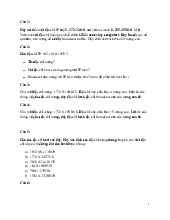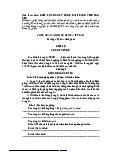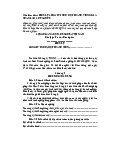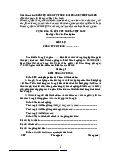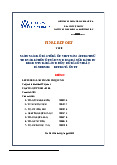




Preview text:
Questions and Answers Section 1 Question:
WIPO has received an international application, however it has not received any fees. Will
WIPO record the international registration? Answer:
WIPO will not record the international registration unless the necessary fees are paid. If
payment is not received, WIPO will send an irregularity notice and if the applicant does not pay
within the given time limit, the application will be abandoned. Question:
How can an applicant pay the fees due for an international application to WIPO? Answer: Fees can be paid to WIPO by:
Direct debit from an account opened with WIPO;
Directly to the WIPO bank account or to the WIPO postal account for those paying within Europe;
Through the Office of origin if the Office has accepted to collect fees and forward them
to WIPO on behalf of the applicant. Section 2 Question:
An applicant has filled in their international application form and posted it to WIPO. They have
then paid their fees directly to the WIPO bank account.
What will WIPO do when they receive the application form? Please explain your answer. Answer:
If WIPO receives an international application form directly from an applicant, the application
will be returned to the sender without being examined. Any fees that may have been paid by
the applicant will be refunded.
This is because an international application has to be filed through the Office of origin, which
must certify that certain information provided in the application corresponds to the information of the basic mark. Question:
The Office of origin has chosen to post international applications to WIPO. Can they send
international application forms that have been handwritten? Answer:
No, if the Office of origin has chosen to post international applications to WIPO those form must
be typed. Handwritten forms are not acceptable. Section 3 Question:
The certification process involves the comparison of the international application to the basic
mark. What information must the Office of origin check to certify the international application? Answer:
The Office of origin must check that:
The applicant named in the international application is the same as the owner of the basic mark.
The mark in the international application is the same as the basic mark.
The goods and/or services listed in the international application are covered by the scope of the basic mark.
Any indications, such as a claim to color as a distinctive feature of the mark, are the
same as those contained in the basic mark. Question:
While not part of the certification process, what information, provided by the applicant, should
the Office of origin ensure is complete and correct? Answer:
The Office of origin should ensure the following information is complete and correct:
The reproduction of the mark in an international application is of sufficient quality.
The applicant has provided a transliteration, for example, if the mark contains non-Latin
characters or numerals other than Arabic or Roman numerals.
At least one Contracting Party has been designated. Note that the Office of origin cannot
be designated in an international application.
If the Office has elected to collect fees on behalf of the applicant, the Office should
check that the fees have been paid. Scenario Answers Applicant details
No, the Office of origin should not certify this international application. The name of the owner
of the basic mark is not the same as the name of the applicant in the international application.
It raises doubts as to whether the international application is filed by the person owning the
basic mark. The Office of origin has to clarify it with the applicant.
Date of the international registration (1)
The date of the international registration is May 5, 2017.
WIPO has received the international application within two months from the date of its receipt
by the Office of origin. The international registration may therefore bear the date on which the
international application was received by the Office of origin.
The irregularity notice issued by WIPO does not concern the essential elements of the
international application whose absence may affect the date of the international registration. In
this regard, the remedied international application will be recorded in the International Register
with the date when it was received by the Office of origin. Dat
e of the international registration ( 2 )
The date of the international registration is December 6, 2017.
The international registration cannot bear the date when the international application was
received by the Office of origin, because WIPO has received the international application later
than two months from the date of its receipt by the Office of origin.
As WIPO found no issues that would further affect the date of registration, the date of the
international registration for this mark is the date when the international application was actually received by WIPO. Goods and/or services (1)
No, the goods and services in the international application are broader in scope than those contained in the basic mark.
The list of goods in class 9 of the international application is broader than that included in class
9 of the basic mark. In particular, the basic mark contains specific claims for computer games
software; computer games programmes; car navigation apparatus. The international
application’s claims for software and are br navigation apparatus oader and may cover other
goods, which are not included in the basic mark.
The international application cannot be certified by the Office of origin. Goods and/or services (2) Question 1:
Yes, the goods and services of the international application are covered by the scope of the
basic mark. The lists of goods and services are identical. Question 2:
No, the limitations for Australia and the United Kingdom include goods that are not covered by the basic mark.
Australia: the claim for retail services in class 35 is broader in scope than retail services
in relation to motor cars provided by the basic mark.
The United Kingdom: limitation includes in class 36, which are not financial services provided by the basic mark.
This application cannot be certified by the Office of origin until the applicant remedies these issues.
